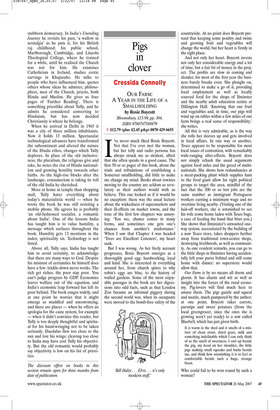Pigs in clover
Cressida Connolly
OUR FARM: A YEAR IN THE LIFE OF A SMALLHOLDING by Rosie Boycott Bloomsbury, £15.99, pp. 304, ISBN 9780747588979 ✆ £12.79 (plus £2.45 p&p) 0870 429 6655 I’ve never much liked Rosie Boycott. Not that I’ve ever met the woman, but her telly and radio persona has always struck me as strident, albeit that she often speaks in a good cause. The first 50 or so pages of this book, about the trials and tribulations of establishing a Somerset smallholding, did little to make me change my mind. Books about townies moving to the country are seldom as revelatory as their authors would wish us believe. This one looked as if it would be no exception: there was the usual lecture about the wickedness of supermarkets and their ill-effects on market towns, and the tone of the first few chapters was annoying: ‘You see, chance comes in many forms, and sometimes one gets one’s chances from another’s misfortunes.’ When I saw that Chapter 4 was headed ‘Trees are Excellent Listeners’, my heart sank.
But I was wrong. As her lively account progresses, Rosie Boycott emerges as a thoroughly good egg: hardworking, loyal and kind. She is interested in everything around her, from church spires to why robin’s eggs are blue, to the history of walled gardens. Some of the most enjoyable passages in the book are her digressions into odd facts, such as that London Zoo became an informal piggery during the second world war, when its occupants were moved to the bomb-free safety of the countryside. At no point does Boycott pretend that keeping some poultry and swine and growing fruit and vegetables will change the world, but her heart is firmly in the right place.
And not only her heart. Boycott invests not only her considerable energy and a lot of time, but a fair bit of money in the project. The profits are slow in coming and slender; for most of the first year the business barely breaks even. She ploughs on, determined to make a go of it, providing local employment as well as locally sourced food for the shops of Ilminster and the nearby adult education centre at Dillington Hall. ‘Knowing that our fruit and vegetables and, in time, our pigs will wind up on tables within a few miles of our farm brings a real sense of responsibility,’ she writes.
All this is very admirable, as is the way she rolls her sleeves up and gets involved in local affairs. In one way or another, Tesco appears to be responsible for most local issues of contention, with remarkably wide-ranging after-effects. Boycott does not simply rehash the usual arguments against food miles and the greed of multinationals. She shows how redundancies at a meat-packing plant which supplies ham to the food giant allow far right political groups to target the area, mindful of the fact that the 300 or so lost jobs are the same number as immigrant Portuguese workers earning a minimum wage and no overtime living nearby. (Visiting one of the laid-off workers, she is astonished to see his wife come home laden with Tesco bags, a case of feeding the hand that bites you.) She shows that Ilminister’s unwanted oneway system, necessitated by the building of a new Tesco store, takes shoppers further away from traditional town-centre shops, destroying livelihoods, as well as community. As one resident remarks, you can go to the little shops in Ilminster having accidentally left your purse behind and still come home with dinner: no superstore would allow that.
Our Farm is by no means all doom and gloom. It has charm and wit as well as insight into the forces of the rural economy. Pig-lovers will find much here to amuse them. The pigs guzzle and squeal and nuzzle, much pampered by the author; at one point, Boycott takes carrots, parsnips and sweet potatoes (from the local greengrocer, since the ones she is growing aren’t yet ready) to a sow called Bluebell, which has just given birth.
It is warm in the shed and it smells of a mixture of clean straw, dried grass, milk and something indefinable which I can only think of as the smell of sweetness. I curl up beside the pig, my head on her shoulder, the little pigs making small squeaks and barks beside me, and think how astonishing it is to feel so comfortable beside such a huge, strange beast.
Who could fail to be won round by such a woman?


















































































 Previous page
Previous page